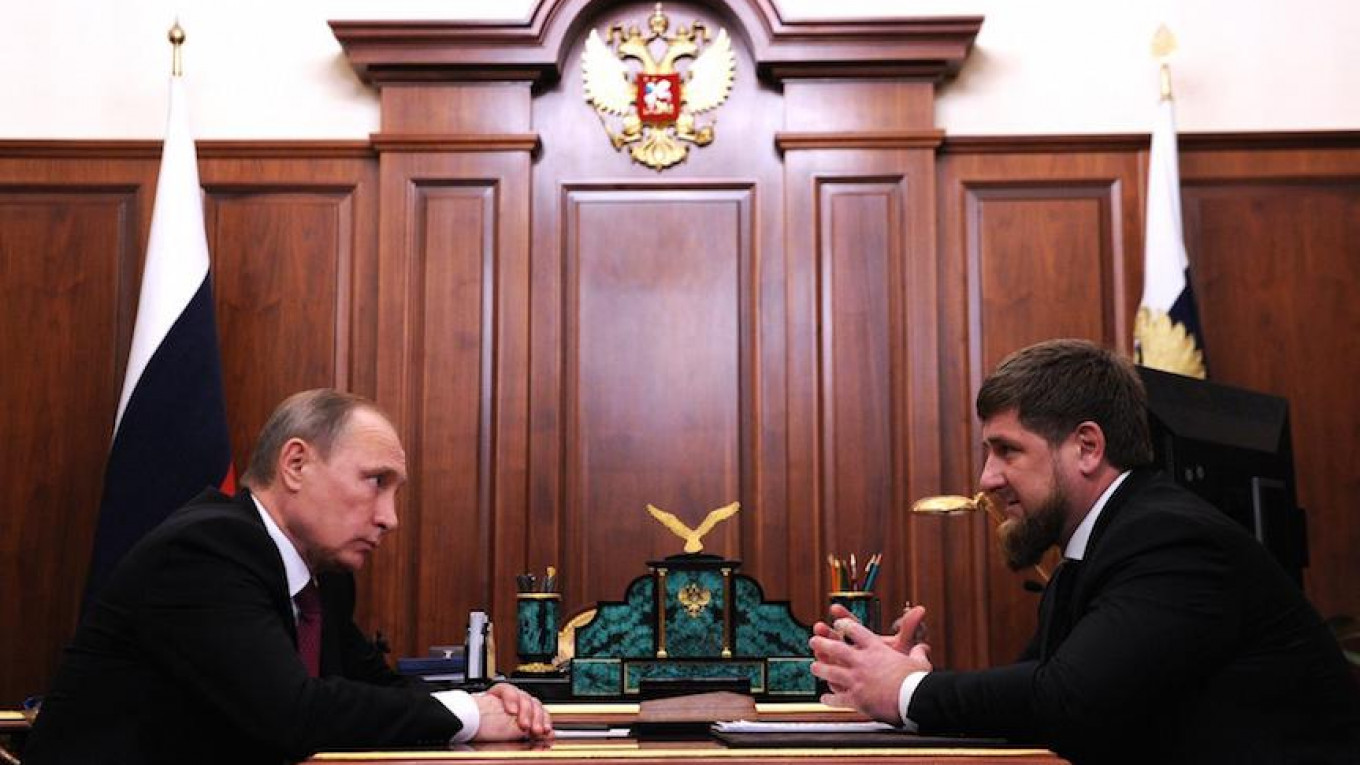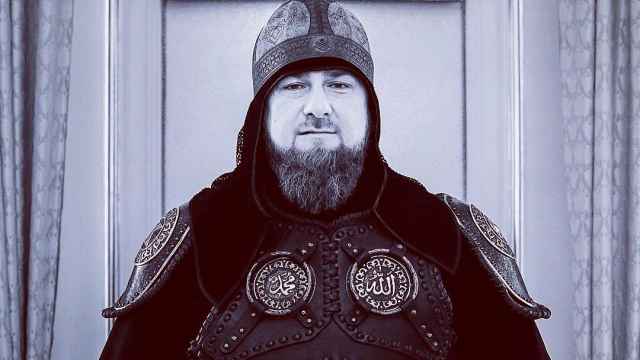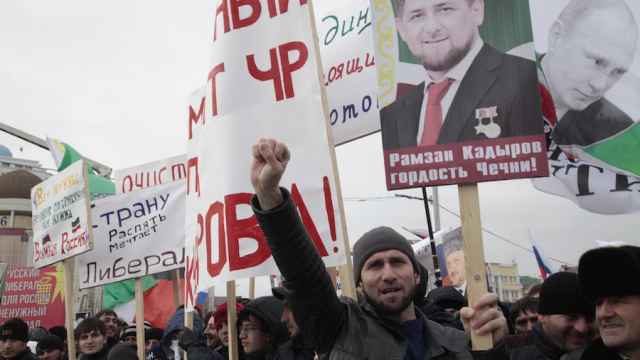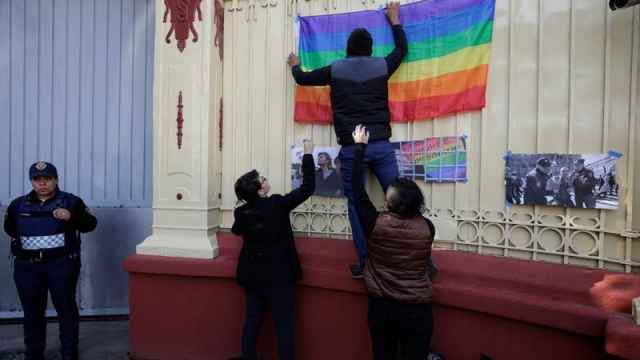All eyes were on the meeting. Chechnya’s mercurial leader, Ramzan Kadryov, had come to the Kremlin for a rare face-to-face chat with President Vladimir Putin.
In recent weeks, the Chechen strongman had found himself embroiled in several controversies, any one of which could merit a powwow with the president.
In early April, the independent Novaya Gazeta newspaper reported that Kadyrov’s security forces were kidnapping, torturing and killing gay men in a mass anti-gay purge. The news had sent shockwaves through the international press, drawing criticism from around the world.
The security situation in Chechnya had deteriorated. Insurgent attacks were on the rise.
And Kadyrov was publicly entangled in a disagreement with Rosneft, Russia’s state-controlled oil conglomerate, about the ownership of a Chechnya-based oil firm. A recent report in the Financial Times suggested the business disagreement was spilling over into conflict between both sides.
Such in-person meetings are generally interpreted as a show of support for Kadyrov. That was probably true this time, too. But many believe Moscow’s patience for its Chechen proxy is waning.
Struggle for resources
Much about the April 19 meeting was unclear. But Putin made one thing explicit: He was trying resolve the disagreement between Kadyrov and Rosneft.
Kadyrov informed Putin that he had met with Sechin, but that “certain misunderstandings” persisted.
The issue was money. Energy analysts say that Rosneft faces serious challenges in Chechnya. Although the oil conglomerate owns a majority share of Grozneftegaz, a company that operates oil assets in Chechnya, its day-to-day operations are controlled by Kadyrov’s team. It has largely mismanaged the company, says Vladimir Milov, president of the Institute of Energy Policy.
“Oil doesn’t extract itself with funding alone. You have to work,” he says. “Chechen authorities don’t see it this way.”
With little opportunity to gain complete control over its oil assets in Chechnya, Rosneft would prefer to sell them off— but Kadyrov found their price too high to negotiate.
Then, on April 11, the Financial Times reported that “the clash had escalated so much that there was a need to investigate whether there was ‘a Chechen connection’” in the April 3 bombing of the St. Petersburg metro.
That claim sounded outlandish to many, but the negative public attention was too much for Putin. He apparently ordered the two sides to make peace. Kadyrov and Rosneft released a joint statement on the Rosneft website in which they called the newspaper’s assertions “deceitful fabrications.”
But Kadyrov understands his power. He clearly took his grievance with Rosneft to Putin. In the wake of the April 19 meeting, energy experts surveyed by The Moscow Times said they believed Rosneft would give the Chechen authorities a discount.
Hidden reality
That prediction was not without its merits. In public, it appears that Kadyrov enjoys Putin’s full endorsement. Even the February 2015 assassination of opposition politician Boris Nemtsov – a shocking crime many tie to Kadyrov – has not significantly altered Putin's support of the Chechen strongman.
Putin knows that Kadyrov has enemies among the Russian elite and human rights defenders, says Maxim Shevchenko, a journalist who serves as a state representative to the North Caucasus. As a result, the president demonstrates that he considers an attack on Kadyrov as an attack on himself.
This bromance is built on an implicit contract: Kadyrov enforces stability in Chechnya, while Putin closes his eyes to human rights violations in the region.
Technically, Kadyrov’s Chechnya is the safest and most developed part of Russia’s North Caucasus. “Roads, schools, hospitals—they’ve got it all,” says Shevchenko, “which distinguishes Chechnya from neighboring Dagestan or North Ossetia.” According to the Chechen leader’s standard message, terrorism has been defeated and the region’s future is bright.
But reality is hardly so rosy. Starting in Dec. 2016, the picture began changing significantly, says Grigory Shvedov, editor of the Caucasian Knot online news agency and an expert on the Caucasus.
“Over the last four months, terror and insurgent attacks have already exceeded the numbers for last year,” he says.
And during the April 19 meeting, Putin appeared to imply criticism of Kadyrov’s rule. He raised the issue of a late March attack on a Russian National Guard regiment in Chechnya, which took the lives of two guardsmen.
“There is no serious terror threat,” Kadyrov told Putin.
“There clearly is some [threat],” the president replied.
Old methods, bad results
Traditionally, Chechen authorities have responded to terror attacks with broad sweep operations. They have been known to take relatives of suspected terrorists hostage, and to burn down suspects’ homes.
Lately, however, these harsh methods of enforcing collective responsibility have stopped working, Shvedov says. What’s more, they are yielding serious side effects.
According to Shvedov, Chechnya’s crackdown on gays was the consequence of a wider crackdown.
To fight resurgent terrorism, the authorities cast a broad net, detaining many people with no direct connection to terror. As is standard practice, the security forces searched through the detainees’ mobile phones. On one of these phones, they discovered gay pornography and the contact information of local gay men. Based on these contacts, the authorities launched a wave of mass detentions of gays.
According to Tanya Lokshina, senior researcher for Human Rights Watch, the crackdown began in late February and lasted several weeks before stopping. In mid-March, it picked up again, and attracted the attention of Novaya Gazeta, which brought the shocking story to public attention.
In the April 19 meeting, Kadyrov brushed off the accusations of an anti-gay crackdown as false. Putin appeared interested, but seemingly unaware of the situation.
Insiders say he knows a lot more than he was letting on.
While Putin might not be worried about rights violations in Chechnya, he is concerned about the negative attention this scandal has attracted, a source close to the Russian government told The Moscow Times. Putin also fears declining stability on the ground in Chechnya. Kadyrov is increasingly failing to deliver his side of their tacit agreement.
“That’s why the tone of the meeting was critical,” says Shvedov.
With Chechnya heavily armed and completely under the control of Kadyrov, Putin can hardly afford to remove or even openly scold the Chechen leader. Airing his grievances with Kadyrov in public is the last thing Putin wants to do.
But the situation inside the republic is growing more volatile. Russia’s economic crisis is delivering a major blow to the region, which is dependant on subsidies. And the children of Kadyrov’s repressed political enemies are on the warpath, a source close to the government told The Moscow Times.
Putin may be trying to show Kadyrov that his power is not limitless, and he cannot have everything he wants.
On April 25, the RBC business news site reported that Kadyrov and Rosneft’s Sechin had finally come to an agreement. Kadyrov’s oil dream would not come true. In contradiction to energy experts’ predictions, however, Rosneft would continue its work in Chechnya, and the Chechen authorities would not receive the company’s local oil and gas assets.
But, par for the course, Putin made sure to throw Kadyrov a bone: Rosneft would invest in Chechnya’s social infrastructure, building housing for the local population.
Even Putin doesn’t change horses midstream.
A Message from The Moscow Times:
Dear readers,
We are facing unprecedented challenges. Russia's Prosecutor General's Office has designated The Moscow Times as an "undesirable" organization, criminalizing our work and putting our staff at risk of prosecution. This follows our earlier unjust labeling as a "foreign agent."
These actions are direct attempts to silence independent journalism in Russia. The authorities claim our work "discredits the decisions of the Russian leadership." We see things differently: we strive to provide accurate, unbiased reporting on Russia.
We, the journalists of The Moscow Times, refuse to be silenced. But to continue our work, we need your help.
Your support, no matter how small, makes a world of difference. If you can, please support us monthly starting from just $2. It's quick to set up, and every contribution makes a significant impact.
By supporting The Moscow Times, you're defending open, independent journalism in the face of repression. Thank you for standing with us.
Remind me later.







